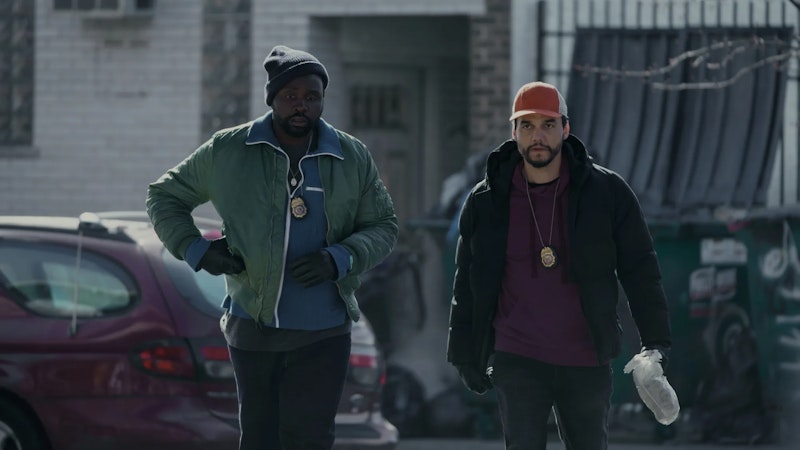While not directly based on a true story, Dope Thief was inspired by the novel of the same name by Dennis Tafoya, a crime author with experience as an EMT in Philadelphia. Many cases Tafoya witnessed informed his crime novels, but the incident that inspired Dope Thief served as a primary influence, even if large swathes were made up to flesh out the details. Two drug hustlers had posed as DEA agents in order to perform ambitious heists, and earned a minor fortune from outmaneuvering local kingpins. However, the pair’s scheme quickly spiraled out of control, as one botched heist put them in conflict with a larger DEA investigation and a powerful Vietnamese drug syndicate.
Tafoya’s novel added original character backstories to fill in the gaps in his knowledge; in the eight-part Apple TV+ adaptation, Brian Tyree Henry plays the recovering drug addict Ray Driscoll, who’s performed cons with his lifelong best friend, Manny Carvalho (Wagner Moura). The series’ best decision is to begin once their operation’s already established; Ray and Manny have learned how to capture the personalities of aggressive, no-nonsense government agents, and managed to sustain low-enough profiles to avoid attention from the authorities or the more powerful pushers in the Philadelphia area. As with most crime sagas, the characters’ are entrapped by their ambition; Manny’s intended to propose to his girlfriend Sherry (Liz Caribel Sierra), and Ray has yearned to provide a better living situation for his adoptive mother Theresa Bowers (Kate Mulgrew). While their intention was to get enough to build a sustainable future, the significant sum put a target on both of their backs.
It’s unfortunate that the detail-oriented table-setting in Dope Thief is handicapped by rote, uninvolving character drama. The notion of two ex-cons that pose as law enforcement had the opportunity to touch on the complex relationship that many underrepresented people have with authority; although Ray and Manny have masked their identities for the sake of survival, their deception’s also a form of wish fulfillment. It’s subtly hinted at early on that their checkered pasts sabotaged any opportunities to “get clean,” as the prejudices that former criminals face are only exacerbated when they come from minority groups. Despite the specificity of its setting, Dope Thief doesn’t have much to say about the cyclical nature of crime in America. Perhaps an eight-part mini-series shouldn’t be held to the same standard as The Wire, but Dope Thief doesn’t show interest in the dimensionality of its supporting characters if they’re not directly correlated to Ray.
If there’s any reason to watch Dope Thief, it's the performance by Henry; while he’s best-known for his scene-stealing role in Atlanta, Henry has earned an impressive number of major screen credits in great films, including If Beale Street Could Talk, Widows, The Fire Inside, and Causeway. Henry’s strength is his ability to play characters that give exasperated, no-nonsense advice (with a touch of sarcasm) to the protagonists. It's much more interesting if this type of supporting character is turned into the lead, as it's easy to understand why someone like Ray is so cynical; after being burdened by poverty, mistreatment, and tragedy for his entire life, Ray is more than willing to take advantage of flaws within the system. The fact that he’s been ignored by those that don’t treat him as an individual has granted him an opportunity to operate under-the-radar.
The irony that he’s only noticed when he has something desirable isn’t lost on Ray; as a lapsed criminal and fake DEA agent, he’s inexperienced for both professions he has feigned experience in. While the blend of bemusement and anxiety that Henry showcased is perfect for Ray’s perception of his misfortune, the series is often swung too hard towards dark comedy or melodramatic plotting. Manny, initially presented as a plausible accomplice to Ray, is turned into an erratic, irrational dolt, whose poor decisions are made to overcomplicate the plot. Although there was a hint of subversive casting with Moura, best known for his terrifying performance as Pablo Escobar in Narcos, it doesn’t justify the irritation that Manny added to the series.
Ving Rhames is introduced halfway through the season as Ray’s father, Bart, a former dealer who’s been in prison since his son was a child. While Ray’s resisted his father’s corrupting influence, he’s forced to seek his advice, as Bart’s connections with the drug world still count. In a heartbreaking twist, Bart is revealed to a self-serving opportunist, as a diagnosis with cancer has left him unconcerned about the future. Rhames may be a recurring cast member in the Mission: Impossible franchise, but he hasn’t played a complicated, manipulative father figure like this since his performance in Baby Boy over two decades ago. Any intrigue that Bart added to the plot is deteriorated by the end, in which he’s transformed into a mustache-twirling villain.
The first episode of Dope Thief was directed by Ridley Scott, and it has a lot in common with his historical crime dramas American Gangster and All the Money in the World; perhaps Scott, who’s spent far too long on faux-epics like Napoleon and Exodus: Gods and Kings, would be better suited for prestige television. There’s nonetheless a significant drop-off in quality, as the immediacy present in the first episode’s riveting final shootout isn’t sustained once the other supporting players are introduced. Dope Thief has a premise that could’ve inspired a tightly-wound, intimate film, or complicated itself over the course of a multi-season series. It’s mischaracterized as a mini-series, which simultaneously feels overextended and not willing to scratch beneath the surface.

